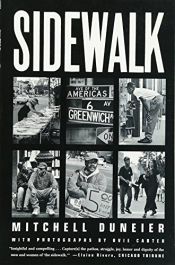Sidewalk
Blurb
"I've had the luxury--if you can call it the luxury," says Hakim Hasan, "of working in the formal economy, and of working at certain companies that required a certain level of training, however rudimentary, and a certain level of education." Instead, he chooses to sell books from a table on the sidewalk in New York's Greenwich Village. Soon after he met sociologist Mitchell Duneier, Hakim described himself as a "public character," and sent Duneier scurrying to reread Jane Jacobs's The Death and Life of Great American Cities to find out what he meant.That moment was one of Duneier's inspirations to spend years studying--getting to know, really--Hakim and other book and magazine vendors on his patch of Sixth Avenue. Sidewalk explains much about the street vendors: How did this become legal? Where do vendors obtain their merchandise? How do they interact with potential customers? When do they find time to go to the bathroom (and, for that matter, where do they go)? But it's ultimately about the people themselves--quoted at length from Duneier's tape-recorded interviews and photographed by Ovie Carter--as they do their best to live successfully on their own terms, with all the good and bad consequences that entail. Some of these people (almost all men) are drug addicts, yes, and some of them choose to live as "unhoused" individuals. But many of them find a strong sense of purpose and identity in their work and choose to live in ways that best facilitate that work; they are as motivated--more, perhaps--as workers holding "respectable" office jobs. Nonacademic readers may glaze over at some of Duneier's longer explanations of his methodology, and he seems occasionally overapologetic when quoting the uncensored language of his subjects, but few books succeed at plunging the reader into a community and delineating the character of its members as Sidewalk does.

 English
English Español
Español Deutsch
Deutsch










Member Reviews Write your own review
Be the first person to review
Log in to comment